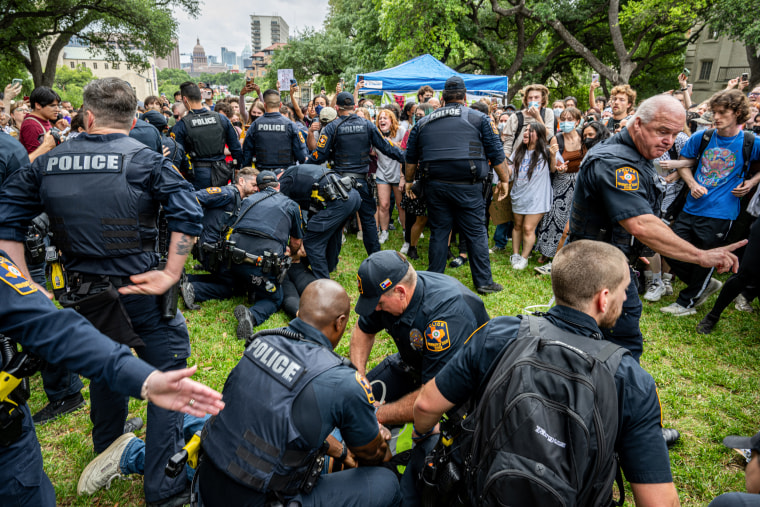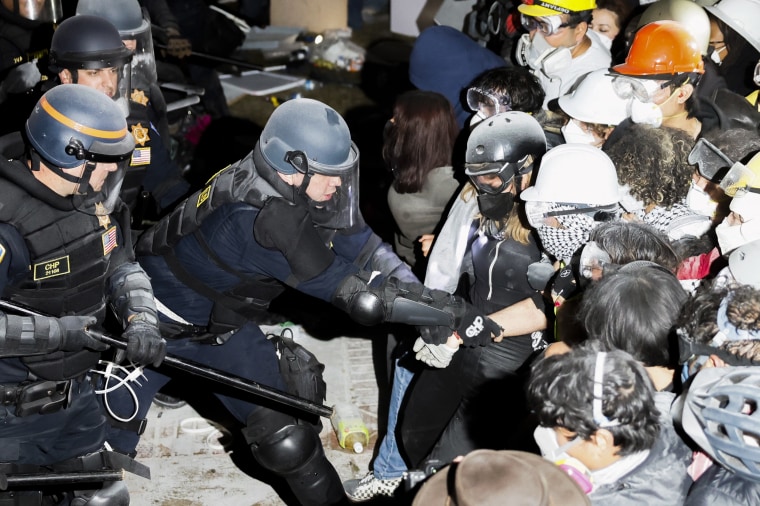Clashes between police officers and pro-Palestinian protesters on university campuses have attracted national attention, shining a spotlight on modern campus activism, law enforcement tactics and the controversial debate over Israel’s war in Gaza. Over the past three weeks, more than 2,000 people have been arrested in the U.S., according to a tally compiled by NBC News.
The arrests of protesters at Columbia University and UCLA have drawn particular scrutiny in recent days, but political demonstrations and heated clashes have also roiled dozens of other campuses across the U.S., from public schools in the South and Midwest to Ivy institutions. League in the Northeast. .
The large number of arrests helps illustrate how quickly pro-Palestinian camps and police responses turned into chaotic hotbeds, dividing campuses and surrounding communities. Meanwhile, Jewish and Muslim students have raised concerns about a sharp rise in anti-Semitism and Islamophobia since the start of the war between Israel and Hamas on October 7.
At least 2,100 people were arrested across the country between April 17 and Thursday night, according to the count. There were at least 100 arrests on eight campuses, including Emerson College and Northeastern University in Boston, Washington University in St. Louis and the University of Texas in Austin.
NBC News compiled arrest records based on statements from universities or local law enforcement agencies.
Over the past month, police have made arrests on campuses including Arizona State University in Phoenix, where 72 people were arrested; California State Polytechnic University, Humboldt, in Arcata, where 32 were arrested; and the University of Utah in Salt Lake City, where 17 people were arrested.
O The wave of arrests has sparked intense debates about how university administrators, police departments, big city presidents and community leaders should enforce laws without infringing on speech.
Leaders at many universities have defended their decisions to appeal to authorities, including when protesters suspected of trespassing or disorderly conduct — and, in Columbia’s case, trespassing on a campus building — did not follow orders to disperse. In some cases, the intensity of the police response drew harsh criticism from protesters, activists and their allies.
Arwyn Heilrayne, 19, a freshman at the University of Texas at Austin who was arrested April 24 during a pro-Palestine protest on campus, described how “all hell broke loose” after officers told the crowd to disperse and allegedly arrested a protest organizer.
“I was way off to the side, just recording, and some police officers came and took me to the ground and arrested me,” Heilrayne said. In the frantic aftermath of the arrest, she struggled to understand what was happening around her.
“I was definitely upset. I was also really confused, honestly, because I was doing everything they asked me to do,” she said. “I wasn’t being confrontational with them or anything. But I was definitely scared.” (She was charged with trespassing, but the charge has since been dropped, she said.)
Alivia, 21, a senior at the University of Wisconsin-Madison, spoke on the condition that NBC News withhold her last name because it was concerned for her safety. She described the moment she was arrested on campus Wednesday as equally tumultuous. “They started grabbing people. They grabbed me and dragged me on the concrete and threw me face down on the concrete,” she said, adding that police hit her head and side to put her arms behind her back.
The Austin and Madison police departments did not immediately respond to requests for comment on both students’ allegations.
In some cases, people arrested on U.S. campuses were students or alumni; in other cases, they were not linked to the campuses in question.
NYPD and Mayor Eric Adams said Thursday that about 29 percent of the 112 people arrested in Columbia on Tuesday were “party unaffiliated.” They added that 60% of the 170 people arrested that day at the City College of New York were also unaffiliated.
Gingger Shankar, a Los Angeles resident who is not a UCLA student but joined the protests on campus, heard police helicopters begin circling over the UCLA camp around 9 p.m. Wednesday. Four hours later, she said, chaos erupted when police fired tear gas and rubber bullets indiscriminately into the camp.
“They were so crazy,” Shankar said. “They kept shooting.”
At around 5:30 am, she joined dozens of protesters who stood idly by to prevent police from entering the camp. She said she heard a police officer say, “Whose arm are we going to dislocate?” Shankar was arrested and charged with unlawful assembly. She has a trial date in July.
In some cases, faculty members were caught in prisons. Noelle McAfee, chair of the philosophy department at Emory University in Atlanta, confirmed in an interview that she was arrested and charged with disorderly conduct last Thursday after observing (but not participating in) the pro-Palestine protest on campus.

McAfee, who is also president-elect of the Emory University Senate, left her position and went to the protest because she was increasingly concerned that university leaders would call in outside law enforcement agencies to dismantle the camp. She said she saw a police officer “attacking” a protester. She told the officer to stop, he told her to back off and she said no.
That’s when she was handcuffed by a police officer wearing a balaclava and taken away. The arrest was captured in a video that was later circulated widely on social media platforms. McAfee said she was booked into the county jail but was quickly released. She called an Uber and went back to her office on campus for a meeting.
“It was traumatic and for four or five nights I didn’t sleep more than an hour. The incident of being taken to prison, frankly, doesn’t faze me at all. What has been terrible is that my own university administration did this to our students,” McAfee said, referring to Emory’s decision to call local police.
In a statement, Emory’s vice president for public safety said the school originally believed the people who built the camp were not members of the community, but that school officials later discovered that this was “not entirely accurate” and was an “incorrect characterization”.
“I take Thursday’s events very seriously and are launching a full review of them so we can develop recommendations to improve how we keep our community safe,” said Vice President Cheryl Elliott. “This review will include how Emory engages outside law enforcement agencies.”

In remarks at the White House on Thursday, President Joe Biden said the nationwide protests “have tested two fundamental American principles. The first is the right to freedom of expression and for people to peacefully assemble and make their voices heard. The second is the rule of law. Both must be maintained.”
Biden’s attempts to quell the unrest can only go so far. Heilrayne, the Texas college student who was arrested last week, said she intends to continue mobilizing for Palestinian human rights.
“It’s a little intense going back to campus and walking past all the police officers who are still on campus. But it’s 100% worth it. Yes,” she said. “As long as Palestinian students at UT ask me to attend, I will continue to attend.”
Daniel Arkin and Daniella Silva reported from New York, Alicia Victoria Lozano from Los Angeles and Maura Barrett from Madison, Wisconsin.
This story originally appeared on NBCNews.com read the full story




































